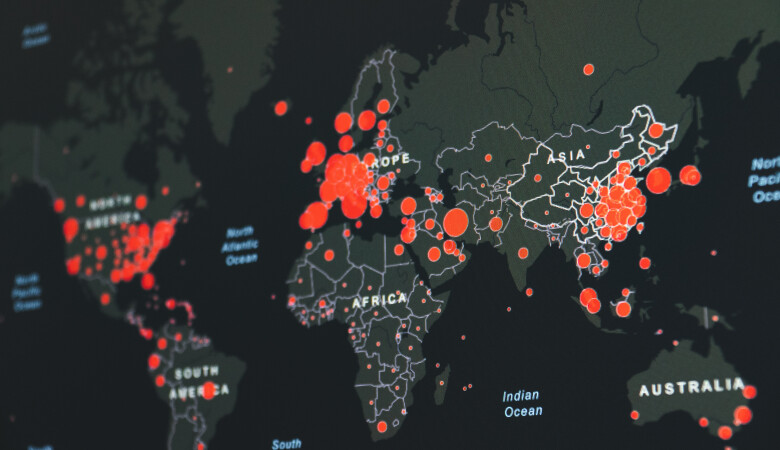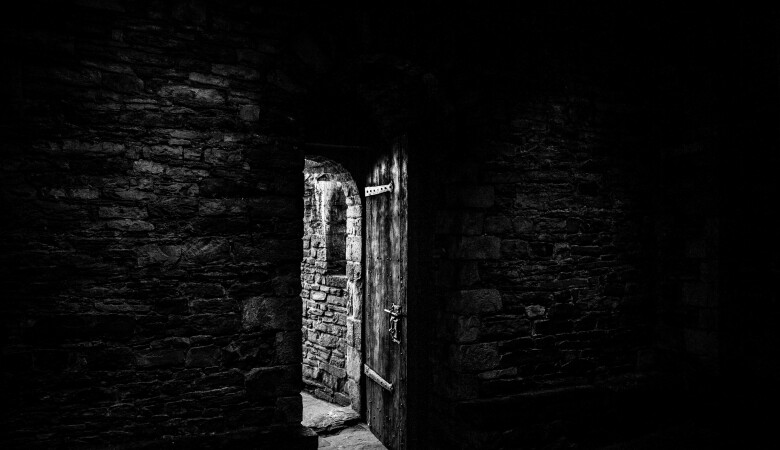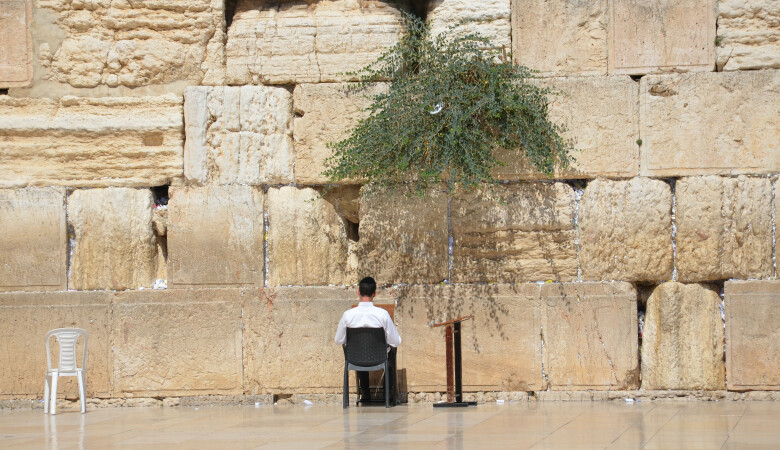Series: Mark
Christ’s Call to Relentless Commitment (Mark Sermon 39)
January 29, 2023 | Andy Davis
Mark 8:34-35
Two Journeys, Fullness in Christ
Christ calls on us to deny ourselves, take up our crosses, and follow him if we wish to go to heaven.
- SERMON TRANSCRIPT -
I. The Relentless Difficulty of Christ’s Demand
Turn in your Bibles to Mark 8:34-35. We'll be zeroing in on these verses on the most difficult command that Jesus has ever given to His disciples, a relentless commitment to follow Him. Look at the words again. "He called the crowd to Him along with His disciples and said, 'If anyone would come after me, he must deny himself and take up his cross and follow me. For whoever wants to save his life will lose it, but whoever loses his life for me and for the gospel will save it.'"
This is such a difficult command to us because it is relentlessly opposed by our three great enemies, the world, the flesh, and the devil. Therefore, at every moment, world, flesh, devil are fighting against obedience to this command. Years ago, I thought about this as I was preaching through the parallel text in Matthew, and the illustration came to me of the arduous and dangerous journey that the Alaska king salmon makes. You picture the salmon swimming 2,400 miles upstream against whitewater, against waterfalls, jumping upward against gravity to make it back to actually the original tributary where they were spawned, and they breed and die. That's the image that's in my mind for this. Their journey is a natural one, though arduous and difficult and defies reason, defies logic. Our journey is a supernatural one. We cannot make a single step in this journey without the power of God in us.
So my desire is to kind of lay a heavy weight on you with this command. I really just want to get out of the way of the words and let Jesus lay that heavy weight on you as He intends to do, but then also to point you to the greatness of the power of God at work in you, if you're born again, to fulfill these words, so both of them. The reason this is so difficult, the central reason, is the nature of the flesh, the nature of the self.
Each human being is born with a dedication to self, to pleasing self, to preferring self, that could best be described as fanatical. It is the central idolatry of the human race. We will do almost anything to please ourselves. Only good parenting teaches an infant gradually the lesson, this fanatical commitment to self, so that we can somehow fit into a world of almost eight billion other such people, each of them also fanatically committed to self so that we can do life together.
The flow of the personality of a human being is an even greater force of nature than that whitewater gravity that you can picture in your mind with the salmon as they're swimming upstream. It is purely natural after Adam's sin in the Garden of Eden, natural for every descendant of Adam and Eve to be fanatically devoted to self, to pursue selfish interest in every conversation, every food choice, every move we make in our cars, every shopping choice we make online or at a mall, every website we go to, everything we do with social media, every text we write. Every solitary choice we make, commitment to self is a more powerful force than that Alaskan whitewater. We're called by this command to fight against it, to swim upstream constantly against your desire to save yourself, feed yourself, please yourself, promote yourself, prefer yourself, choose yourself, coddle yourself, cherish yourself.
Jesus is actually calling on you to deny yourself, to be willing to die for Him and to do it continually, like I prayed in Romans 12, to be a living sacrifice, just constantly dying, all the time dying on the altar to God, to die in small and large acts of self-sacrifice.
Some, a very small percentage of His followers in this world, are called on literally to die physically for Him, for the gospel as martyrs, but all of us a kind of a living martyrdom continually. That's the life that Christ is calling every disciple who follows Him to take. That is the only life that leads to heaven. It is the life that Christ Himself lived, and it is the life He calls on us to live. It is absolutely astonishing to me how much Christ gave for us.
As Jesus died on the cross in our place under the wrath of God, His lifeblood was pouring out of His body. His clothes, His little pile of possessions that He had that was left were being gambled over in order to fulfill prophecy and mark Him as the Messiah. There was absolutely nothing He held back for us.
It is also absolutely astonishing to me how much Jesus gives to us, inconceivable the riches of the grace of God, inconceivable the value of full forgiveness of all of your sins, past, present, and future in the eyes of God, a new heart, a transformed inner nature so that you're a new creation in Christ, the gift of adoption into the family of God, to be called a son or daughter of the living God, to receive the gift of the indwelling Holy Spirit, the third person of the Trinity living inside you, ministering Christ to you constantly. The promise of a fruitful life lived for the rest of your life, a life worth living, not vanity of vanities like the writer of Ecclesiastes says, but something of eternal consequence laid out before you. Then when you die, glory, intimate face-to-face fellowship with God, seeing His face, and in the end, a resurrection body that is glorious and powerful and incorruptible and spiritual. It's inconceivable almost what Christ gives to us.
But just as amazing in this text is what Christ demands from us. The answer is everything. He gives everything for us. He gives everything to us and, in this text, He demands everything from us. That's the call of Christian discipleship. That's the cost of discipleship. Anything less than your very best every moment of your life is less than this demand. So let's walk through it. Let's look at the context of Christ's demand.
"He gives everything for us. He gives everything to us, and in this text, He demands everything from us. That's the call of Christian discipleship."
II. The Context of Christ’s Demand
We're in the Gospel of Mark, the theme right from the beginning, the beginning of the gospel of Jesus Christ, the Son of God. It's the consummation also, in the centurion after Jesus died said, "Truly, this man was the Son of God." [Chapter 1, chapter 15]. In the middle, we're in chapter 8, seems to be the crux, the centerpiece right in the center. All four Gospels are to bring you to a confession of faith. This is describing what that life will be like if you make that confession, so these are very, very important verses.
We're in Caesarea of Philippi. Jesus is on retreat with His apostles. On the way, He asked them, "Who do people say that I am?" They talk about it. "What about you? Who do you say that I am?" The most important question you'll ever face, as I preached last time, the central question, who do you say that Jesus is? Do you believe that He is the Christ, the Son of the living God? That was Peter's confession in Matthew's fuller version, Matthew 16:16. There in that chapter, Jesus then immediately promises, "On this rock, I will build my church, and the gates of Hades will not prevail against it. I'm going to build my church. I'm going to build my kingdom on this rock." But Jesus then told them what the cost would be to Him, what He would have to do to build His church. Mark 8:31-32, "He then began to teach them that the Son of Man must suffer many things and be rejected by the elders, chief priests, teachers of the law and that he must be killed and, after three days, rise again." He spoke plainly about this.
Peter couldn't handle it, he took Him aside and began to rebuke Him. But when Jesus turned and looked at His disciples, He rebuked Peter, "Get behind me, Satan." He said, "You do not have in mind the things of God, the things of man." The significance of this is weighty. Peter's conception of where they were heading, the kingdom and all that, was all wrong. It was too human. It was too self-serving, too selfish, too carnal, too fleshly, too human-like.
Jesus has had to strip them, all of them, of their human conceptions of this kingdom to establish that He Himself will have to die on the cross to pay for it and that all of His disciples have a similar pattern to follow in order to go to heaven and to build His kingdom, a daily denial to self, a willingness to die to self.
Look at the full statement again. Verse 34-38, "Then He called the crowd to Him along with His disciples and said, 'If anyone would come after me, he must deny himself and take up his cross and follow me. For whoever wants to save his life will lose it, but whoever loses his life for me and for the gospel will save it. What good is it for a man to gain the whole world, yet forfeit his soul? Or what could a man give in exchange for his soul? If anyone's ashamed of me and of my words in this adulterous and sinful generation, of him will the Son of Man be ashamed when He comes in His Father's glory with the holy angels.'"
As Christ's disciples deny themselves, take up their crosses, and follow Him in obedience to His commands, then Christ's kingdom will be built, and the gates of Hades will not prevail against it. Essential to that is that His disciples be willing to deny themselves, lose their lives in this Earth so they can save them in eternity. They have to understand that their eternal souls are worth more than anything this material world has to offer. They have to fight the assault this God-hating world will lay on us that we should act ashamed of the gospel and of Christ because only by boldly, clearly proclaiming Christ and His gospel will the kingdom be built. That's the whole section here.
The fullness of these themes is so weighty, I believe, in my judgment as a preacher, that we can't deal with them in just one sermon. So we're going to deal with them in three. I do believe that this is the crux. This is the center. This is the call, and we need to understand it. This week and then two more weeks, you're going to hear the same scripture read, Mark 8:31-38, for three straight weeks.
III. To Whom Christ Makes His Demand
To whom does Christ make this demand? Remember that Peter interestingly took Jesus aside to rebuke Him. One of the more interesting moments in the Peter/Jesus relationship, "Hey, Jesus, do you have a moment just privately over here? I just have something to say." Isn't it nice how Peter was trying to protect Jesus' reputation? Isn't that kind of him to do that? The arrogance. Jesus didn't go private with His rebuke of Peter.
He rebuked Him in front of all the apostles because He knew they're all thinking the same thing, Peter just voiced it. Then He expands with this statement to everyone, to the whole crowd. He wanted everyone within earshot to hear this. This is not a secret, private teaching here. He wants anyone who's evaluating Jesus and the cross to count the cost if they're going to follow Him. It's a heavy dose of realism here for all of us.
Look to whom it's addressed. "If anyone would come after me," that's anybody, to the entire world He's saying this. What does it mean to come after me? To follow me in imitation of me in this life, but then also in terms of destination. Where are we going? It brought to mind John 14:1-4. There, Jesus says, "Do not let your hearts be troubled. Trust in God. Trust also in me. In my Father's house are many rooms. If it were not so, I would have told you, for I'm going there to prepare a place for you. If I go there and prepare a place for you, I will come back and take you to be with me so that you also may be where I am. You know the way to the place where I'm going."
I think of that in terms of, if anyone would come after me, if anyone would go where I'm going. Then He said in John 14:4, “'You know the way to the place where I'm going.’" Then Thomas said to Him, ‘Lord, we don't know where you're going, so how can we know the way?’" Then Jesus said famously, "I am the way and the truth and the life. No one comes to the Father except through me."
If anyone would come after me, so “to come after me” means to go to the Father, to go to the place I'm preparing, to go to heaven. But also He said, "You know the way." They said, “We don't know where you're going." "I am the way." So “to come after me” means also to imitate him. He is the way you get to heaven. So to believe in him, imitate him, saturate yourself in him, if you would come after him, that's what He's saying.
IV. Understanding Christ’s Demand
Let's understand, the demand comes in three parts. There are three parts of it, three aspects. Deny yourself, take up your cross, and follow Jesus. So first, deny yourself. What does that mean? Say no to you. Deny what your flesh wants to do. Say no to your selfishness, your fanatical commitment to self. Picture that salmon swimming upstream. You want to follow Jesus today? You have to fight for it. It's going to be hard today. The world of flesh and the devil will be opposing you today because of, as I already mentioned, our fanatical commitment to self.
Every single baby born on the face of the planet is born with one thing in common. That's that fanatical commitment to self. We get it from our first father, Adam, who turned away from God to “embrace me”, embrace himself, and we're born into that. What's in it for me at every moment? We feel it every moment. We can't say it's like genocide or rape or serial murder or some other things. We can't understand how anyone could be that evil. Well, I understand that. But we know this, how could anyone be so evil as to completely be committed to self?
“Now wait a minute, now you're starting to meddle. You're talking about me." Yes, we're talking about all of us. We understand this one. Jesus is saying, "Deny yourself. Turn away from that gravitational pull within you to be all about you, to be all about you. Kill your selfishness. Kill it every single moment.” Richard Baxter in his classic, The Christian Directory, said this, "Selfishness is the radical," that means the root, "positive sin of the soul comprehending in seed form and, as a primary cause, all other sins."
Everything starts with selfishness. It starts with self. Selfishness is the cause of all wars, all marital squabbles, all lawsuits, all luxury and poverty, all addictions, all parenting struggles, all church splits, all vaunting, ambition. Basically, all trouble between human beings starts with this one, selfishness. Consider how sweet life would be on this planet if this one sin could be eradicated, this love of self, but you’ve got the wiring. Then Satan cleverly has crafted a world to pander to you, to tell you you deserve the best. You deserve luxury. You deserve the weekend away at the spa or the best luxuries that you ... It's all about you. It's lying to you, and everybody is receiving that lie and actually part of it, perpetuating it. That's the world system, and Satan's cleverly pressing it in.
"All trouble between human beings starts with this one, selfishness."
We're surrounded every day by people who are driving and pushing and striving to meet their own self-interests, who if you let them go first, they'll assume that's the way it should be. They'll probably look on you as weak. But if you don't let them go first, some of them at least will show what they really feel about that. You know what I mean out on the highways, the whole merge moments in life. Car A, car B, neither one wants to give an inch. That's it. That's what we're dealing with. That's exactly what Jesus is telling all of us to deny. All of us are, at best, en route on this one. No one has arrived. The church has definitely insufficient sanctification on this. Richard Baxter again said this, "Selfishness is the hardest sin in the world to overcome. The person that seemed to have put sin to death the best, if you do but cross them in their self-interest or opinion or seem to slight them or have a low esteem of them, what swellings, what heart burnings, what bitter censuring, what proud impatience, if not schisms or separations will result.” Just look at yourself. If somebody disagrees with you, are you awesome with that? Somebody takes something you wanted. Somebody metaphorically or literally takes the last cookie. It's just in us, and none of us is done with this. Nobody's arrived on this one. Deny yourself. It's a constant battle. I say it's the bitterest battle of your life.
Second, take up your cross. Be willing to stoop down and pick up what all of those Jews back then knew was an article of execution by the worst possible way. That's what the cross meant to them. It wasn't theoretical or abstract to Jesus' disciples. It's estimated that in Jesus' lifetime, the Romans executed over 30,000 people. Every single day, they saw people nailed to crosses. Jesus, and I don't think He's made it clear yet at Caesarea of Philippi, but He will very soon make it clear that's how He's going to die. He's going to be lifted up. He's going to be crucified. I don't know that He's used that language yet. But they can well imagine if the Romans are involved, that's how He's going to die.
But imagine they're shocked when He tells them that they have to take up their cross, to take up their cross. They have to be willing to die painfully, slowly, to be executed. What is this? What does it mean? Is it a metaphor? Is it a parable? What is the cross? It's not merely some distressing burden in life, like a medical issue, like a chronically sore back or cancer even, or a difficult job or a difficult spouse or rebellious child or some other such thing. Non-Christians have those sufferings. Those are common to all mankind. That's not what it is. People use that expression, "Oh, it's just my cross to bear." Be careful when you say that. Be careful what you're meaning.
So what is it? I think it's specifically the suffering you have to go through in the two journeys. What are the two journeys? The internal journey of holiness, growth in holiness, and the external journey of gospel advanced through evangelism and missions. Those two journeys are hard journeys, and it will hurt you to make progress in them. That's what it means to take up the cross. You have to die to yourself, and that death will be painful if you're going to grow in holiness, and if you're going to take the gospel to lost people. That's how I understand the cross. On the external journey, it is this, "Blessed are you when people insult you, persecute you, and falsely say all kinds of evil against you because of me.” I mean I don't want any of that to happen to me. That's the cross. It's going to hurt. It's going to be difficult.
Then in terms of the internal holiness, Galatians 5:24, "Those who belong to Christ Jesus have crucified the flesh with its passions and desires." To die to what you want, your dreams, aspirations, preferences, pride, to die to your desire for approval from others, your desire for comfort and security in this world, your yearning for love and success and money and pleasure and fun and all of that, die to it.
Thirdly, "Follow me," Jesus says. Follow Jesus. It's a life of imitating Christ, of following His self-denying example, especially in His death on the cross. He willingly drank the cup the Father gave Him in Gethsemane saying, "Not my will, but yours be done." What does He mean there? We're not going deep into the Trinity and think that there's different wills between the Father and the Son. Not at all. He's saying, "Every fiber of my being as a human being is towards self-preservation, toward that I would not suffer and die. But I'm willing to lay all that aside for your will to be done in me, not my will, but yours be done."
To follow Jesus, 1 John 2:6, "Whoever claims to live in Him must walk as Jesus did." It's an imitation of Christ in this self-denying life. Obedience is essential to this. Jesus said in Luke 6:46, "Why do you call me Lord, Lord, and do not do what I tell you to do?" Deny yourself, take up your cross, and follow Jesus is to obey Him meticulously. Just whatever He's commanded you to do, to do it. Or again, John 14:15, "If you love me, you'll obey what I command.” In one of the Synoptics, Luke's Gospel, he adds one word, but it's an important word. Luke 9:23, "Then He said to them all, 'If anyone would come after me, he must deny himself and take up his cross daily and follow me.'" No days off, no hours off, no moments off. It's relentless. "Take up your cross daily and follow me."
V. The Paradox of Christ’s Demand
Jesus gives us a paradox. There's a paradox to Christ's command. Look at verse 35, "Whoever wants to save his life will lose it, but whoever loses his life for me and for the gospel will save it."
It's interesting. People who prefer themselves and give themselves what they want are frequently the most miserable people. I don't know if you remember years ago the movie, Chariots of Fire. It has Harold Abrams, who is a Jewish man who is the fastest runner in England and all that. He's contrasted with a Christian man, Eric Little, who was just as fast or almost as fast. They were definitely contrasted. It's really clearly a compare and contrast because when Harold Abrams wins his gold medal, which he sought for the last number of years through relentless sacrifice, he gets the gold medal and he's out with his coach. They're getting drunk in some French bar, and there's no one around them. The barkeeper says, "It's 3:00 in the morning, go home," and that's it. He's clearly depressed. One person lamented, "I spent my whole life climbing the ladder of success only to discover it was leaning against the wrong wall."
Almost 20 years ago, Tom Brady, at that point, the New England Patriots quarterback, was being interviewed in 60 Minutes, by a journalist named Steve Croft. Brady said these amazing things. "A lot of times I think I get very frustrated and introverted, and there's times where I'm not the person I want to be. Why do I have three Super Bowl rings?" Stop. Now he's got seven, but then three.
"Why do I have three Super Bowl rings and still think there's something greater out there for me? I mean maybe a lot of people would say, 'Hey, man, this is what it is.' I reached my goal, my dream, my life. Me, I think it's got to be more than this. This is it. I mean this can't be what it's all cracked up to be. I mean I've done it. I'm 27." He was 27 then, 45 now. He said, "What else is there for me?" And then the journalist, Steve Croft, said, "Well, what's the answer?" And Brady said, "I wish I knew. Wish I knew."
That just seems like someone who's lost and just doesn't know. I mean they got what they wanted. They got everything that this world says you should go after, and it's just straight empty. You find your life, you lose it in this world. The book of Ecclesiastes already knew this. Ecclesiastes 1:14, "I've seen all things that are done under the sun. All of them are vanity, a chasing after the wind." But more than that, eternal judgment follows such a life of selfishness.
We're going to discuss this more next time. It's such a weighty topic. I don't want to get into it. But what would it profit someone to gain the whole world and lose his soul? We're going to talk about the soul and what it is to lose it next week. I think this is what it is. It's to hear these dreadful words spoken about you. "Depart from me, you who are cursed, into the eternal fire prepared for the devil and his angels.” Whoever finds his life will lose it eternally.
It's terrifying. But whoever loses his life in the pattern He's commanding will find it. Jesus is the treasure hidden in the field, who the man when he found it, in his joy, he sold everything and bought that field. It's worth everything you have in your life. That's how valuable. What is the treasure in the field? Is it not Jesus in whom are hidden all the treasures of wisdom and knowledge? Is it not Jesus, the Glorious One? Jesus is the finding of the life. It's what you get if you lose your life. You find it in Jesus. More on this next time.
VI. Practical Applications
Let's make some practical applications. First and foremost, for me, just as a preacher of the gospel, to call you to follow Christ, to repent of your sins, and trust in Christ. In order to do that, you have to understand these words. Jesus is standing here as your evangelist telling you, "You want to save your soul? You want to save your life? You want forgiveness of sins? Then you have to deny yourself, take up your cross, and follow."
He's very honest about this. He wants you to count the cost before you become a disciple. There are a lot of evangelists these days that do some kind of benefit evangelism or Jesus as life enhancer kind of thing. That's not what Jesus would do. Jesus is not life enhancer. Jesus is life itself. So He's not going to lie to you. True evangelists, true evangelists, true missionaries, true pastors will not lie to you and tell you if you follow Christ, you'll get all of the things you want, the prosperity gospel stuff, health and wealth and success and all that. That's not what this text is saying.
"Jesus is not life enhancer. Jesus is life itself."
But you will get life forever and all of those rich benefits I described at the beginning of the sermon when you come to Christ. What are you waiting for? Come to Christ. Don't lose your soul. Don't lose your life. Then if you have come, I just want to say to you, don't be discouraged by this. I'm telling you the truth. The text, Jesus is telling you the truth. This is the Christian life. This is the life you need to keep living, but God's going to help you.
Jesus said, "I'll not leave you as orphans. I'll help you." [Philippians 2:12-13] This is all the help you need, but there's a lot of other verses like it. "So then as you've always obeyed not only in my presence, but now much more in my absence, continue to work out your salvation with fear and trembling. For it is God who works in you to will and to do according to His good purpose." Praise God for that. He will give you what you need every day to deny yourself, take up your cross, and follow. He will strengthen you for it. He will help you. So follow Him.
Understand this. Understand this is the call of Christian discipleship. This is the real thing. So in the future, if you're not in this church anymore, go to a church that will help you obey these commands. Go to a church that will tell you the truth and say, "You need to deny yourself, take up your cross, and follow Jesus daily." That's the Christian life. Then you'll have brothers and sisters around you in small groups and in worship, and you'll hear preaching that will help you do this. That's a healthy church. Find it.
In the meantime, this is what we're committed to do for all of you and for ourselves, and you do it for us, that we're going to help each other follow Christ to heaven. Along with this come all kinds of detailed sub struggles that come, slaying sin, putting sin to death. It's part of this. Denying yourself, take up your cross, and follow means mortify your sins. Romans 8:13, "If you, by the Spirit, put to death the deeds of the flesh, you will live because those who are led by the Spirit of God, these are the sons of God.” That's what it means. You're going to deny yourself, take up your cross, and follow Jesus to the point of slaying temptations, putting sin to death in all those categories.
Then just daily life, your prayer life, it's like, "I want to have a good prayer life." Deny yourself, take up your cross, and follow. You know what's going to happen. Your alarm's going to go off tomorrow. You had to set it a little earlier because you want to grow in prayer. Good. It's going to take time. Good. You want to spend more time in prayer, more passion in prayer. The alarm goes off saying, "I'm here to help you. You wanted me." It's like, "No, no, no. I changed my mind." Your alarm, being the weak-willed friend, says, "I have a snooze mechanism. You can just push me, and I'll circle back with you in 10 minutes." If you want to grow in grace, you've got to deny yourself. If you want to grow in prayer, You have to deny yourself. Once you're on your knees and you're praying, your flesh wants you to stop, wants you to stop, and you got to keep pressing on to pray for all the people God has laid on your heart. Prayer life.
Your Bible reading's the same. I know back on January 1st, you made a commitment. "I'm going to read through the Bible in a year." If you've been faithful, that's great, it’s a daily thing. It's a average of about half hour or more a day. But if you're still waiting to get started, it's now more like 45 minutes a day or 40 minutes a day. But you have to deny yourself, take up your cross, and follow to be faithful in Bible intake.
So also with your church life as a fruitful member of this church, to just be involved in the life of the church. Come to worship on Sunday morning. You have to deny yourself and take up your cross and follow. To be involved in home fellowship, some of you are hosting home fellowship. You have to deny yourself to do it, and we're grateful that you do. There's a self-denial in church involvement.
I want to say to you, the elders of this church announced and made it plain in our budget for the year 2023 that we're committed to planting churches, to church planting in 2023. What that means is that we're going to farm off a significant group of you to not be here anymore and to go to a church plant that will have, I promise you, growing pains, and you know it. You're going to have to make financial sacrifices to see that thing get going financially, and the church has to as well.
This is a vision that I think the Lord's laid on all of us. Why ? Because it is healthy, local churches that plant other healthy, local churches, not institutions that do that or state conventions and all that. It's healthy churches. We have an obligation. This region is growing numerically, population. There are people pouring in here who are unchurched. We need lots of local churches, healthy, local churches to meet that need. Churches like ours have an obligation to plant churches.
I want all of you throughout this year to feel the weight of that, whether you go or not. We're not going to guilt manipulate anyone into going, but we're going to ask you to say, "Should I be part of that?" At least go to the informational meetings whenever they start. Even if you don't go, just say, "I want to make a financial contribution," or, "I want to at least pray for it, and I want to be encouraging people that are going." We cannot plant churches, not just in 2023, but going forward without deny ourselves, taking up our cross, and following.
We could go through all of the areas. I've got a bunch of headings here. Marriage, husbands are called on to give themselves up like Christ gave himself up for the church. That lines up perfectly with deny yourself. "To be a godly husband, do this. Lay down your life for your wife." She has to do the similar thing just from this verse. She has to lay herself down for you, too. That's healthy marriage.
Parenting, I already covered this briefly. One writer said, "One of the ways that God helps you with your selfishness is to bring someone into your life who's far more selfish than you are." However cute he or she is, I'm telling you, you know what I mean. They have very little interest in making it comfortable for you at 3:00 in the morning. It gets more complex as time goes on. Sorry, you young parents who think it's going to get easier. You're going to get over the hill and then that little thing, and then it's going to be smooth sailing. No, it's not. You're going to have to deny yourself, take up your cross, and follow to be a godly parent. So it is with all of these areas.
The last one I want to leave you with is evangelism. Could it be that there's some specific person that God has carved you out to be the one to reach? They're surrounded by Christians here in this region, but you're the one. You're the one. It could be a workplace thing. It could be a relative. It could be a neighborhood thing. You cannot reach them without denying yourself, taking up your cross, and following. So be willing to do that for the glory of God in the building of His kingdom.
Close with me in prayer. Oh, Father, thank you for this incredible, clear teaching from Jesus. In one sense, hard to hear, but in another sense, we're so grateful for the realism, for the truth. The Bible tells us the truth, and we're grateful, Lord, that Jesus hasn't left us as orphans. He comes to us by the Spirit and enables us to do this, but we know it's hard. So help us, oh Lord. Help us to be willing to put sin to death, to get out of habits of wickedness that are entangling us, to grow in grace in the knowledge of Christ by means that Jesus has laid out before us in this beautiful text. In Jesus' name, we pray. Amen.































